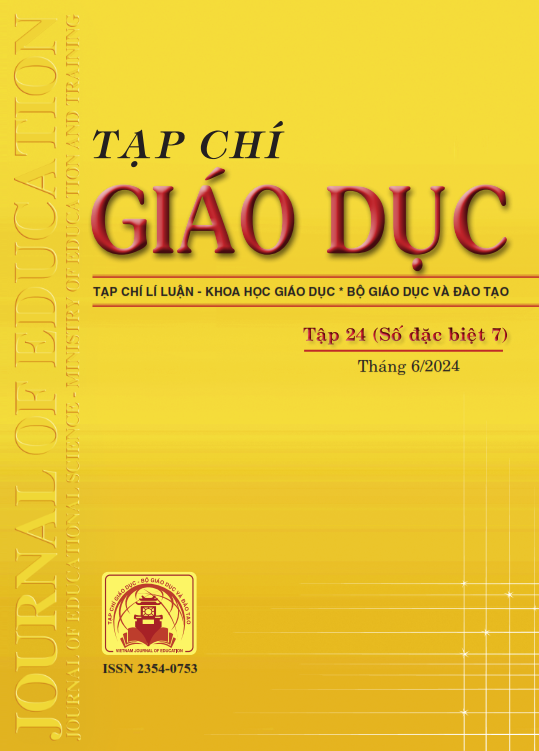Thiết kế bài toán theo bối cảnh trong dạy học nội dung “Đạo hàm” (học phần Toán cao cấp) nhằm phát triển năng lực giải quyết vấn đề theo bối cảnh cho sinh viên sư phạm Toán
Tóm tắt
Teaching practice shows that many university students still encounter many difficulties in demonstrating their problem-solving competences within mathematics and in real-world situations related to derivatives. Therefore, it is essential to find teaching approaches that help students develop their competences to solve those problems. The aims of this study are to propose the process of designing context problems in teaching derivatives (Advanced Mathematics module) to develop contextual problem-solving competence for students and illustrate the analysis of opportunities to develop their contextual problem-solving competences when solving the specific context problem designed according to the process. Research results show that the designed context problems help students fully demonstrate their contextual problem-solving competences. In addition, factors such as the reality of information and data of the problem provide numerous opportunities for students to use information technology in all steps of the contextual problem-solving process.
Tài liệu tham khảo
Bittinger, L. M., Ellenbogen, J. D., & Surgent, J. S. (2012). Calculus And Its Applications (10th edition). Pearson Education, Inc.
Blum, W. & Leiß, D. (2007). How do students and teachers deal with modeling problems?. Mathematical Modeling (ICTMA12): Education, Engineering and Economics. Chichester: Horwood Publishing, pp. 222-231.
Boaler, J. (1993). The role of contexts in the mathematics classroom: Do they make mathematics more real? For the Learning of Mathematics, 13(2), 12-17.
Gravemeijer, K., & Doorman, M. (1999). Context problems in realistic mathematics education: A calculus course as an example. Educational Studies in Mathematics, 39, 111-129.
Greefrath, G. (2011). Using technologies: New possibilities of teaching and learning modelling - Overview. In: Kaiser G., Blum W., Borromeo Ferri R., Stillman G. (eds). Trends in Teaching and Learning of Mathematical Modelling ICTMA 14 (pp. 301-304). Dordrecht: Springer.
Illanes, M. K. G., Breda, A., Manríquez, D. D. C., & Martínez, H. A. A. (2022). Analysis of a teaching learning process of the derivative with the use of ICT oriented to engineering students in Chile. EURASIA Journal of Mathematics, Science and Technology Education, 18(7).
Lê Thị Bạch Liên (2021). Kiến thức để dạy học đạo hàm và năng lực nghiệp vụ của giáo viên toán tương lai. Luận án tiến sĩ Khoa học giáo dục, Trường Đại học Sư phạm - Đại học Huế.
Maaß, K. (2006). What are modelling competencies?. ZDM, 38(2), 113-142.
Nguyễn Thị Mai Thủy (2021). Tiếp cận dạy học toán theo bối cảnh với phương án REACT và hỗ trợ quá trình mô hình hóa toán học. Tạp chí Khoa học Đại học Huế: Khoa học xã hội và nhân văn, 130(6B), 193-214.
Nguyễn Thị Tân An (2014). Sử dụng toán học hóa để phát triển các năng lực hiểu biết định lượng của học sinh lớp 10. Luận án tiến sĩ Giáo dục học, Trường Đại học Sư phạm TP. Hồ Chí Minh.
Phan Anh Tài (2014). Đánh giá năng lực giải quyết vấn đề của học sinh trong dạy học toán lớp 11 trung học phổ thông. Luận án tiến sĩ Giáo dục học, Trường Đại học Vinh.
Reinke, L. T., & Casto, A. R. (2020). Motivators or conceptual foundation? Investigating the development of teachers’ conceptions of contextual problems. Mathematics Education Research Journal, 1-25.
Schukajlow, S., Kolter, J., & Blum, W. (2015). Scaffolding mathematical modelling with a solution plan. ZDM: International Journal on Mathematics Education, 47(7), 1241-1254.
Wijaya, A., Van den Heuvel-Panhuizen, M., Doorman, M., & Robitzsch, A. (2014). Difficulties in solving contextbased PISA mathematics tasks: An analysis of students’ errors. The Mathematics Enthusiast, 11(3), 555-584.
Đã Xuất bản
Cách trích dẫn
Số
Chuyên mục
Giấy phép

Tác phẩm này được cấp phép theo Ghi nhận tác giả của Creative Commons Giấy phép quốc tế 4.0 .












